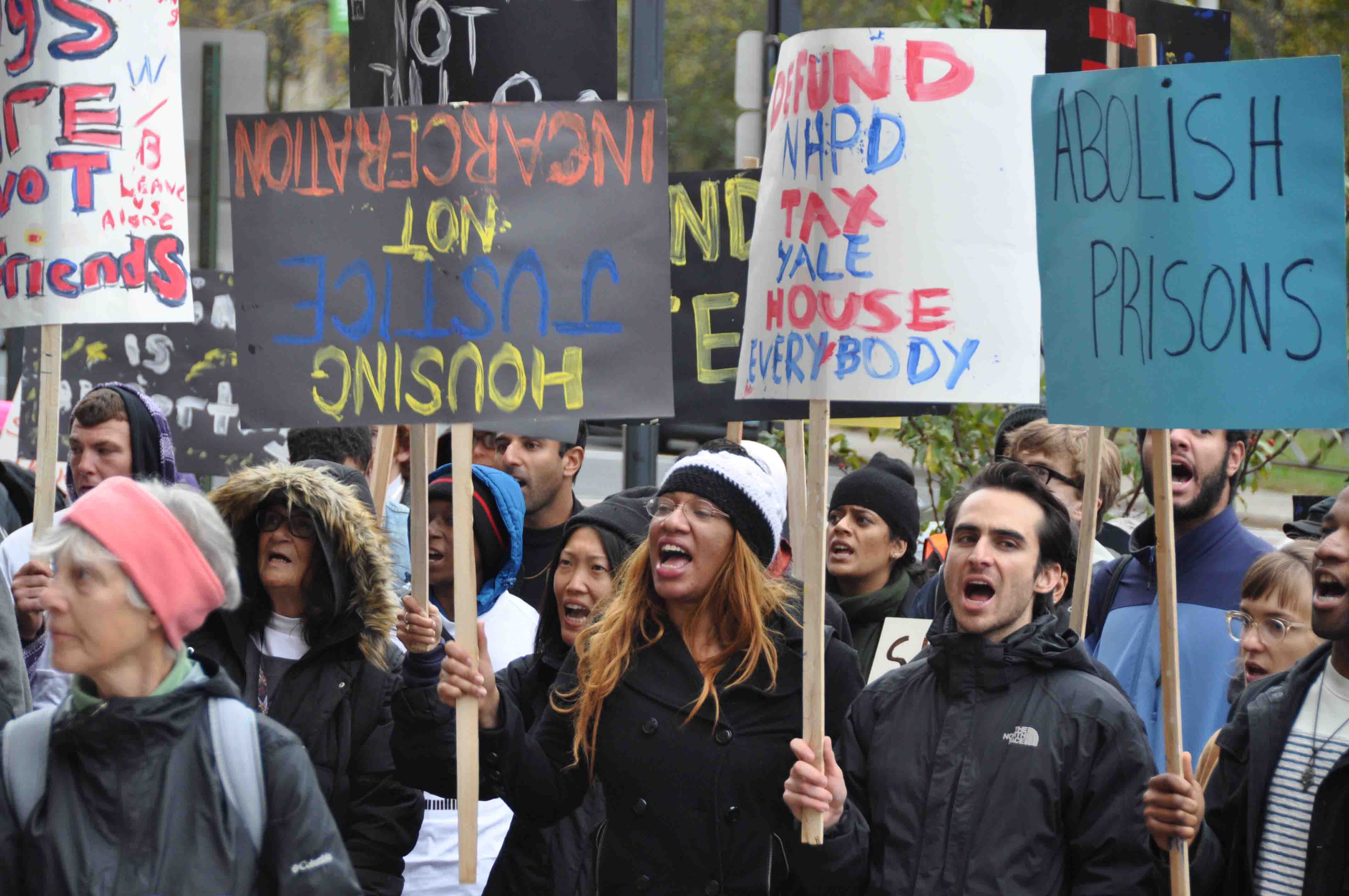
In 1641, the Puritans completed work on the New Haven Green, which they hoped would serve as a marketplace and common space for the colony’s residents. In light of this history of shared ownership, it seems natural to activist Quentin Staggers that many homeless residents of the city would adopt the space as their home and absurd that police would try to force them out.
On Wednesday afternoon, Staggers — a homeless man — marched through the city with a crowd of around 50 people to protest what he described as the city’s inaction on homelessness. Staggers worked with the Connecticut Bail Fund and other local activist groups to organize the demonstration. Attendees marched past major New Haven landmarks including City Hall and the state courthouse, chanting, “Fight, fight, fight, fight, housing is a human right.”
“I started this mission six and a half years ago,” Staggers said to the News. “I’ve seen a lot of injustice — I’ve seen people out here for years with me, and I’ve seen people come from another city and get housing like that.”
Staggers and organizers from the Bail Fund compiled a list of demands for the winner of next Tuesday’s mayoral election to address. Posted online at Change.org, the list includes appeals to decriminalize activities like loitering and sleeping in public spaces, expand and improve the city’s anti-homelessness initiatives and end the tax-exempt status of Yale property.
Homeless participants in the march painted a grim picture of their lives. Rick Johnson, who has been homeless for three years, said the city’s policies seem to trap homeless citizens in an impossible choice.
“The shelters don’t treat you as people. But if you don’t live in a shelter and stay outside, you might get arrested,” Johnson said. He added that the Immanuel Baptist Shelter on Grand Avenue was infested with bedbugs, a criticism repeated by several speakers.
According to a report this year by the Connecticut Coalition to End Homelessness, in 2015, Connecticut received federal certification that it was the first state to end chronic homelessness, and in 2016, it became the second state to end homelessness among veterans. On Jan. 24, 2017, the night the Coalition took its survey, there were 498 people in emergency shelter and transitional housing and 45 unsheltered people in New Haven.
Mayoral spokesman Laurence Grotheer noted that New Haven’s difficulties with eradicating homelessness arise from both the city’s finite resources and the complex needs of each homeless resident. For example, refraining from drug use is a requirement to stay in public shelters, he said.
“New Haven’s commitment to help homeless residents is ongoing,” Grotheer said. “The city appropriates approximately $1 million a year to help its partners in the nonprofit sector to provide services to those residents. By comparison, that dollar figure represents a greater commitment to ending homelessness than other cities in Connecticut.”
Other homeless residents at the protest complained of continued mistreatment by the police. March participant Shronda Bell said she once was verbally harassed by police officers as they forced her to leave her makeshift home and kicked down the cardboard holding it up.
New Haven Police Department spokesman David Hartman said the department does not have a set policy toward homeless people on the New Haven Green.
“If they need help, we get them help,” Hartman said. “If they’re committing a crime, we arrest them. If that’s what you want to call harassment, then that’s harassment, but we deal with [individual] people, not ‘homeless people.’”
During a poster-making session on the Green on Saturday in anticipation of the march, homeless resident Shakine Hannons blamed the city’s continued problems with homelessness on Mayor Harp. She cited Harp’s denial of Staggers’ proposals and the lack of visibility of services for the homeless in the city as problems with Harp’s tenure.
“We’re out here rooting for her, but she’s not rooting for us,” Hannons said.
The Office of Housing & Homelessness Services administers New Haven’s efforts to eliminate homelessness.
Will Wang | will.wang@yale.edu







